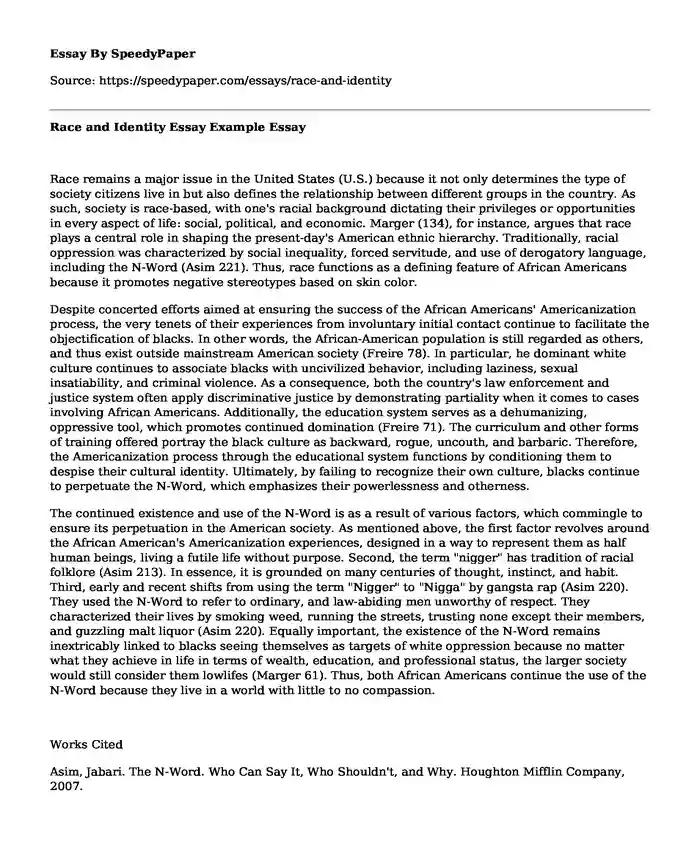Race remains a major issue in the United States (U.S.) because it not only determines the type of society citizens live in but also defines the relationship between different groups in the country. As such, society is race-based, with one's racial background dictating their privileges or opportunities in every aspect of life: social, political, and economic. Marger (134), for instance, argues that race plays a central role in shaping the present-day's American ethnic hierarchy. Traditionally, racial oppression was characterized by social inequality, forced servitude, and use of derogatory language, including the N-Word (Asim 221). Thus, race functions as a defining feature of African Americans because it promotes negative stereotypes based on skin color.
Despite concerted efforts aimed at ensuring the success of the African Americans' Americanization process, the very tenets of their experiences from involuntary initial contact continue to facilitate the objectification of blacks. In other words, the African-American population is still regarded as others, and thus exist outside mainstream American society (Freire 78). In particular, he dominant white culture continues to associate blacks with uncivilized behavior, including laziness, sexual insatiability, and criminal violence. As a consequence, both the country's law enforcement and justice system often apply discriminative justice by demonstrating partiality when it comes to cases involving African Americans. Additionally, the education system serves as a dehumanizing, oppressive tool, which promotes continued domination (Freire 71). The curriculum and other forms of training offered portray the black culture as backward, rogue, uncouth, and barbaric. Therefore, the Americanization process through the educational system functions by conditioning them to despise their cultural identity. Ultimately, by failing to recognize their own culture, blacks continue to perpetuate the N-Word, which emphasizes their powerlessness and otherness.
The continued existence and use of the N-Word is as a result of various factors, which commingle to ensure its perpetuation in the American society. As mentioned above, the first factor revolves around the African American's Americanization experiences, designed in a way to represent them as half human beings, living a futile life without purpose. Second, the term "nigger" has tradition of racial folklore (Asim 213). In essence, it is grounded on many centuries of thought, instinct, and habit. Third, early and recent shifts from using the term "Nigger" to "Nigga" by gangsta rap (Asim 220). They used the N-Word to refer to ordinary, and law-abiding men unworthy of respect. They characterized their lives by smoking weed, running the streets, trusting none except their members, and guzzling malt liquor (Asim 220). Equally important, the existence of the N-Word remains inextricably linked to blacks seeing themselves as targets of white oppression because no matter what they achieve in life in terms of wealth, education, and professional status, the larger society would still consider them lowlifes (Marger 61). Thus, both African Americans continue the use of the N-Word because they live in a world with little to no compassion.
Works Cited
Asim, Jabari. The N-Word. Who Can Say It, Who Shouldn't, and Why. Houghton Mifflin Company, 2007.
Freire, Paulo. Pedagogy of the Oppressed, 30th Anniversary Edition. The Continuum International Publishing Group, Inc., 2005.
Marger, Martin. Race and Ethnic Relations: American and Global Perspectives, 7th Edition. Belmont, CA: Thompson Learning, Inc., 2006.
Cite this page
Race and Identity Essay Example. (2022, Apr 05). Retrieved from https://speedypaper.com/essays/race-and-identity
Request Removal
If you are the original author of this essay and no longer wish to have it published on the SpeedyPaper website, please click below to request its removal:
- Essay Sample: Qualities of a Good Salesperson
- Financial Reporting Regulations and Requirements, Free Essay from Our Database
- A Case Analysis of Acme Company. Essay Example.
- Essay Sample on Child Development: Learning Space for 3 to 4 Years Preschoolers
- Sport Essay Example About Strength and Conditioning Coaches
- Free Essay: Being Black, and Living in the Red
- Free Essay. Verizon SWOT Analysis
Popular categories





